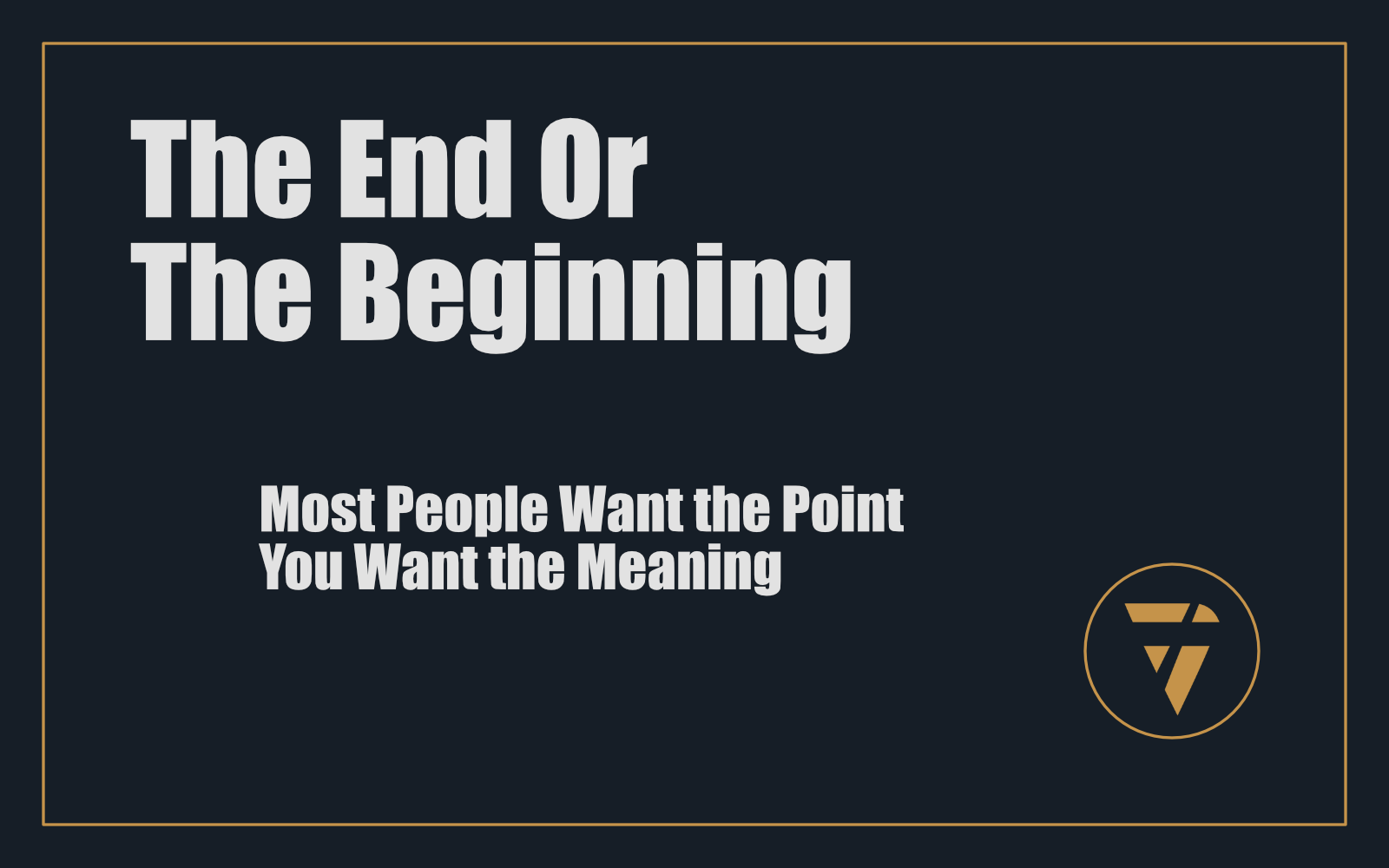The End Or The Beginning

Most People Want the Point. You Want the Meaning.
They flip to the last page. Scan the headline. Jot the bullet points. Grab the quote that sounds smart enough to post. The modern reader isn’t reading, they’re extracting. Speed over depth. Summary over structure. Point over meaning.
But you? You go back to the beginning.
Not out of nostalgia. Not because you’re lost.
Because you understand something most don’t: the point without the premise is hollow. The conclusion without the context is dangerous. The surface without the source is noise.
And you’re not here for noise.
You're here for coherence.
The Era of Extractive Thinking
We live in an age of shortcuts. TLDR has become a cultural norm. SparkNotes, executive summaries, YouTube explainers—everything filtered, flattened, and fractioned into consumable pieces. We reward those who package well, not those who think deeply.
In boardrooms, it sounds like: “Get to the punchline.”
In marketing: “What’s the one-liner?”
In self-help: “Give me the three steps.”
In spirituality: “Just tell me the practice.”
In politics: "Axe the Tax."
But reduction is not understanding. Efficiency is not insight. The more we rush to the point, the more disconnected we become from the architecture that gives that point its power.
Think about it.
If you only ever consume the answer, you never see how it was built.
You never see the questions that gave it form. The tension it resolved. The contradictions it held. The failures it was born from. You are handed the fruit but never shown the root.
Remember every time the teacher told you to show your work.
We're forgetting how to do that.
And eventually, that hollowness catches up.
Because when your life breaks, your business stalls, or your relationships falter, a bullet point can’t fix it. You’ll need something sturdier. Something coherent. Something built from the beginning.
The Discipline of Returning to Origin
Going back to the beginning is not regression. It’s restoration. It’s how you reclaim the original intention. It’s how you ask the right questions before you chase the wrong outcomes. Some AI's I know could use this advice.
Every beginning contains three silent forces:
- Definition — What is this really about?
- Frame — What assumptions are being made?
- Direction — What kind of motion is being invited?
Skip these, and you will build well-articulated chaos.
When you return to the beginning of a book, a conversation, a belief system, or a personal journey, you are not indulging nostalgia. You are searching for fidelity.
You’re asking: what did we agree on before we started running? What was this supposed to become? What was the shape of truth before we edited it to make it palatable?
Why the Beginning Holds More Than the End
The ending is a product. The beginning is a posture.
In every great story, the first few pages hold the DNA of everything that follows. In every successful company, the original problem is the most honest one. In every long-lasting relationship, the first moment of recognition is more sacred than the rituals that come later.
But most people forget. They get busy. They get clever. They get rewarded for performance, not alignment.
So they drift.
They stack tactics on unclear truths. They double down on strategies built on old lies. They scale things that were never supposed to grow. And when the weight of success collapses, they wonder what went wrong.
What went wrong is they skipped the beginning.
They wanted the point. But they never earned the meaning.
The False Seduction of “The Point”
Here’s the danger.
When you obsess over the point, you start treating complexity as the enemy. You look for slogans that sound true instead of patterns that are true. You cling to answers that feel good instead of asking questions that cost you something.
The point is seductive because it feels like closure. It lets you believe you’ve arrived. It gives you something to say at dinner parties, something to post on LinkedIn, something to whisper to yourself when things get uncertain.
But if that point wasn’t built from your own examination, your own lived tension, it will not hold when tested.
A conclusion that wasn't earned will always betray you.
The Sacred Work of Meaning
Meaning is not handed to you. It’s assembled.
It’s what you build when you sit inside the material. When you let discomfort ferment. When you refuse to rush to clarity. When you trace every insight back to its origin. When you ask not just what’s being said, but why now? From whom? To what end?
Meaning emerges when you’re willing to be the kind of person who reads the foreword. Who studies the prologue. Who lingers in the introduction not because it’s entertaining, but because it tells you what the rest of the book thinks it is.
Meaning isn’t for the casual.
It’s for the ones who choose to reconstruct the logic instead of just repeating the line. Who want to understand the architect before they live in the house. Who aren’t afraid to question the foundation before they decorate the walls.
You are not looking for another opinion. You're learning how to see.
Living from the Beginning
This isn’t just about books.
It’s about how you relate to your own life.
When your work feels misaligned—go back to the beginning.
When your relationship feels distant—go back to the moment you first saw each other.
When your faith feels mechanical—go back to the ache that made you reach for God.
When your business loses traction—go back to the pain it was born to solve.
The beginning never lies. It holds the original transaction. The first glimpse of truth. The uncynical intention.
And in a world addicted to endings, the beginning is your competitive advantage.
The Invitation
So no, you are not slow. You are not indecisive. You are not behind.
You are the one who chose to understand before you act.
You are the one who chose to build coherence before chasing momentum.
You are the one who chose to find meaning instead of just collecting points.
That doesn’t make you trendy.
It makes you dangerous.
Because the ones who know the beginning, really know it, can rewrite the ending any time they choose.
You read it all. :)
Thank you.
Now write.
This is what I’m working on. Tell me what you think, I enjoy the conversation! Subscribe and follow the work in real time.
Thanks!
B

They want the conclusion. You want the origin. That’s why they chase clarity, and you build it.
PS -






